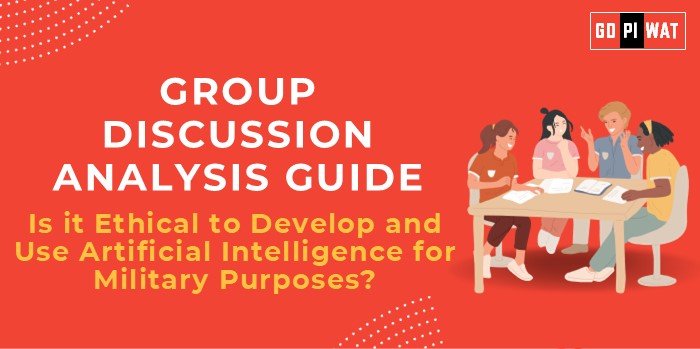📋 Group Discussion (GD) Analysis Guide
Is it Ethical to Develop and Use Artificial Intelligence for Military Purposes?
🌐 Introduction to the Topic
Opening Context: “The integration of artificial intelligence (AI) in military operations has revolutionized modern warfare, raising crucial ethical, legal, and security concerns.”
Topic Background: Military AI applications include autonomous drones, predictive analytics, and cyber defense systems. However, these developments spark debates on their ethical implications, including accountability in autonomous weapon systems and the risks of escalation.
📊 Quick Facts and Key Statistics
- Global Military AI Spending: Expected to reach $18 billion by 2025, reflecting its growing role in defense strategies.
- Autonomous Weapon Systems: Deployed in over 30 countries, emphasizing the widespread adoption of AI technologies.
- AI-Driven Cybersecurity Breaches: Increasing incidents underscore dual-use risks of AI in warfare.
- UN Resolutions: Ongoing debates in the UN about regulating Lethal Autonomous Weapon Systems (LAWS).
👥 Stakeholders and Their Roles
- Governments: Develop AI policies and fund military research.
- Tech Companies: Innovate military AI technologies but face ethical accountability.
- International Organizations: Regulate and mediate ethical standards (e.g., UN, ICRC).
- Civil Society: Advocate for ethical usage and highlight humanitarian concerns.
✅ Achievements and Challenges
Achievements:
- Enhanced Surveillance: AI-powered drones increase battlefield awareness.
- Precision Targeting: Reduces collateral damage in operations.
- Efficient Logistics: AI optimizes military supply chains and predictive maintenance.
Challenges:
- Ethical Dilemmas: Accountability in autonomous decision-making.
- Escalation Risks: Potential arms race in AI development.
- Bias and Errors: AI systems prone to biases may lead to unintended consequences.
🌍 Global Comparisons:
- Success: Israel’s Iron Dome leverages AI for real-time threat detection.
- Challenge: The UN struggles to establish a binding treaty on LAWS.
Case Study: The U.S. Project Maven successfully applied AI in surveillance but faced internal dissent over ethical concerns.
🔀 Structured Arguments for Discussion
- Supporting Stance: “Military AI enhances precision, reduces human casualties, and strengthens national security.”
- Opposing Stance: “Autonomous weapons challenge ethical boundaries and may escalate global conflict.”
- Balanced Perspective: “While AI’s potential in defense is undeniable, ethical guidelines must precede deployment to ensure responsible usage.”
📚 Effective Discussion Approaches
- Opening Approaches:
- Statistical Insight: “With AI-driven military spending projected at $18 billion, its transformative impact on global defense cannot be ignored.”
- Philosophical Opening: “Should machines have the authority to decide matters of life and death in warfare?”
- Counter-Argument Handling:
- Recognize concerns about accountability and propose human oversight mechanisms.
- Highlight examples where ethical AI guidelines have mitigated risks.
📈 Strategic Analysis of Strengths and Weaknesses
SWOT Analysis:
- Strengths: Enhanced operational efficiency; reduced risk to human soldiers.
- Weaknesses: Ethical dilemmas in autonomous systems; high development costs.
- Opportunities: Collaboration on global AI ethics frameworks.
- Threats: Arms race and misuse by rogue states or non-state actors.
🔗 Connecting with B-School Applications
- Real-World Applications: Analyze AI ethics for military strategies in operational management.
- Sample Interview Questions:
- “What role should governments play in regulating military AI?”
- “Can ethical AI frameworks prevent misuse in defense?”
- Insights for B-School Students:
- Explore AI’s impact on security management.
- Assess its implications on international relations and policy.


